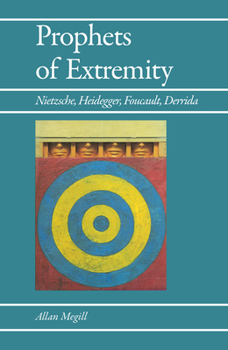Prophets of Extremity: Nietzsche, Heidegger, Foucault, Derrida
Select Format
Select Condition 
Book Overview
Examines the philosophical works of Nietzsche, Heidegger, Foucault, and Derrida, and analyzes the connections between their viewpoints.
Format:Paperback
Language:English
ISBN:0520060288
ISBN13:9780520060289
Release Date:May 1987
Publisher:University of California Press
Length:423 Pages
Weight:1.07 lbs.
Dimensions:1.0" x 5.6" x 8.3"
Customer Reviews
3 ratings
The Visionaries of Postmodern Extremity
Published by Thriftbooks.com User , 14 years ago
"For anyone desiring a challenging introduction to the philosophers who are--inescapably--the most significant heralds of Post-Modernism, Allan Megill's work is an essential text." T. Farrell Four Philosketeers: I wondered who are those mysterious Western intellectual innovators whose names are tied with postmodernism, Derrida, Foucault, Gadamer, and what do they have to do with Nietzche and Heidegger? Allan Megill facilitates within a compelling foursome introduction to these end of millennium musketeers of postmodern philosophy, wrapped in obscured evasive thesis of surreal thought that dominated postwar Europe. How helpful to relate Foucault to Heidegger and Nietzsche, and Derrida is the anti visionary who follows in their wake, according to author's conclusion, even if he was not sure of the impact of Foucault and Derrida on the history of ideas. To Hegel's famous dicta, "the owl of Minerva spreads its wings only with the falling of the dusk," Megill replies, "But Minerva's owl, that is philosophy, has repeatedly over the last three hundred years, played a morning role, preceding rather than following social and political history." A historical note: In the 1960's, the structuralist, a French movement, attempted to synthesize the ideas of Marx, Freud and Saussure, contesting the existentialists' claim stressing that the human essence is determined through life choices, so that each man is what he makes himself. For the structuralist the individual is shaped by sociological, psychological and linguistic structures over which wo/man has no control, but which could be uncovered by using their methods of investigation. Michel Foucault came to be the main representative of the post-structuralist movement, he did not think that there were definite underlying structures that could explain the human condition and that it was impossible to step outside of discourse and survey the situation objectively. The 'anti visionary' Jacques Derrida developed deconstruction as a technique for uncovering the multiple interpretation of texts. Influenced by Heidegger and Nietzsche, Derrida suggests that all text has ambiguity and because of this the possibility of a final and complete interpretation is impossible. Informed review: "The reader of Prophets of Extremity will have no dearth of richly articulated issues to rethink along the lines suggested by Alan Megill...[who] provides his reader with stunning constellations of quoted material from his authors, so that, regardless of any debate [it] may arouse, the book is a splendid mixture of narrative and analysis, written to be read and critiqued by the student of modern thought." New Vico Studies
A great compendum, 4,5 stars!
Published by Thriftbooks.com User , 17 years ago
I think this is a great introduction for the more serious scholar of these four thinkers whose influence has been magnificent and still-growing. It is unwise today to live in ignorance of Nietzsche et al., and in many circles impossible. I think the book well-researched and quite wealthy in information. Especially I appreciate the care with which Megill, one of the more prestigious contemporary intellectual historians, explicates some cumbersome ideas of the prophets. He lets them speak but clarifies their ideas. In addition, the close link between aesthetics/art and these thinkers is well-noted.
Amazing work on Nietzsche, Heidegger, Foucault and Derrida
Published by Thriftbooks.com User , 24 years ago
Perhaps the first, and certainly the most successful synthesis to date of these philosophers. Each section of analysis highlights the important contributions of each philosopher that influenced those later in the book. Allan Megill makes them understandable and speak for themselves through lucid commentary and extensive quotes. The reader of this book will walk away with a solid feeling for and extensive familiarity with each of the philosopher's works, and have an understanding of the rise and tenets of postmodernism. The development of the book is natural and captivating. The breadth and depth of research alone is impressive, and accompanied by detailed explanations. Finer points are discussed and made clear in this book that are never mentioned elsewhere.The analysis of Nietzsche in particular is among the best I have seen. The chapters on Heidegger, Faucoult, and Derrida are also well done.After reading this book there should be little doubt why Prophets of Extremity should be considered the primary entry point for those interested in these philosophers.






